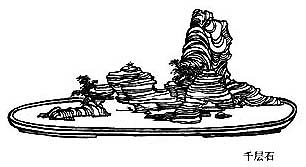論
語
Lun Yu 
 – The Analects of Confucius
– The Analects of Confucius
The Master discusses with his disciples and unveil his preoccupations with society. Tr. Legge (en), Lau (en) and Couvreur (fr).
Lunyu XVII. 7. (454)
Confucius, inclined to respond to the advances of an unworthy man, protests against his conduct being judged by ordinary rules.
1. Pî Hsî inviting him to visit him, the Master was inclined to go.
2. Tsze-lû said, "Master, formerly I have heard you say, 'When a man in his own person is guilty of doing evil, a superior man will not associate with him.' Pî Hsî is in rebellion, holding possession of Chung-mâu; if you go to him, what shall be said?"
3. The Master said, "Yes, I did use these words. But is it not said, that, if a thing be really hard, it may be ground without being made thin? Is it not said, that, if a thing be really white, it may be steeped in a dark fluid without being made black?
4. "Am I a bitter gourd? How can I be hung up out of the way of being eaten?"
Legge XVII.7.
Pi Hsi summoned the Master and the Master wanted to go. Tzu-lu said, 'Some time -ago I heard it from you, Master, that the gentleman does not enter the domain of one who in his own person does what is not good. Now Pi Hsi is using Chung Mou as a strong- hold to stage a revolt. How can you justify going there?' The Master said, 'It is true, I did say that. But has it not been said, "Hard indeed is that which can withstand grinding"? Has it not been said, "White indeed is that which can withstand black dye"? Moreover, how can I allow myself to be treated like a gourd which, instead of being eaten, hangs from the end of a string?'
Lau [17:7]
Pi Hi invita Confucius à aller le voir. Le Maître voulait s'y rendre. Tzeu lou dit : « Maître, autrefois je vous ai entendu dire que l'homme honorable n'entre pas chez un homme engagé dans une entreprise malveillante. Pi Hi, maître de Tchoung meou, a levé l'étendard de la révolte. Convient-il que vous alliez le voir ? » Le Maître répondit : « Il est vrai, j'ai dit ces paroles. Mais ne dit-on pas aussi qu'un objet très dur n'est pas entamé par le frottement ? Ne dit-on pas aussi qu'un objet essentiellement blanc ne devient pas noir par la teinture ? Suis-je donc une courge ventrue, qui peut être suspendue, et ne pas manger ou n'être pas mangée ? » Confucius dit : « Ferme et pur, je peux sans danger m'exposer au contact de la noirceur. Pourquoi ne répondrais-je pas à l'invitation de Pi Hi, par crainte de me souiller moi-même ? Suis-je donc une courge ? M'est-il permis de me rendre inutile aux hommes, comme une courge qui reste suspendue toujours dans un même endroit, et ne peut rien faire, pas même boire ou manger ? » (Tchou Hsi)
Couvreur XVII.7.

The Analects of Confucius – Lun Yu XVII. 7. (454) – Chinese on/off – Français/English
Alias the Lunyu, the Lun Yü, the Analects, les Entretiens du maître avec ses disciples.
The Book of Odes, The Analects, Great Learning, Doctrine of the Mean, Three-characters book, The Book of Changes, The Way and its Power, 300 Tang Poems, The Art of War, Thirty-Six Strategies
Welcome, help, notes, introduction, table.
Index – Contact – Top























